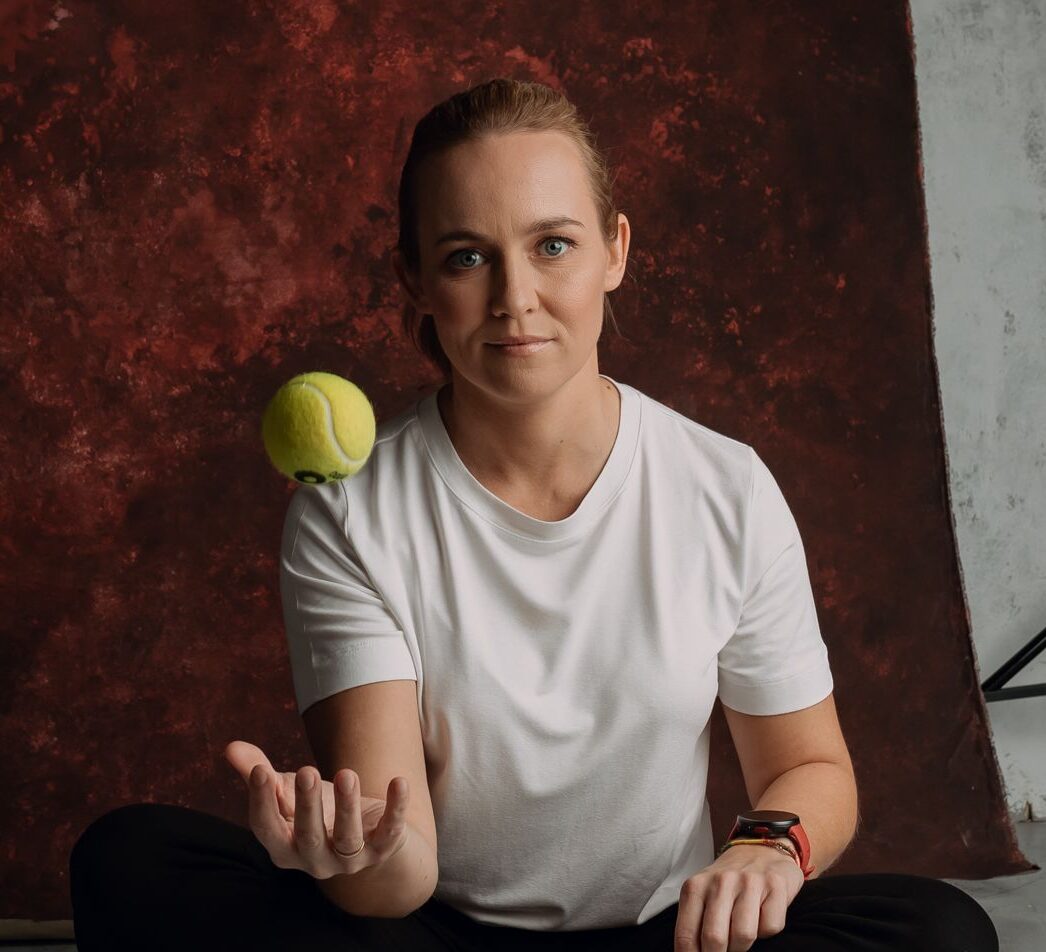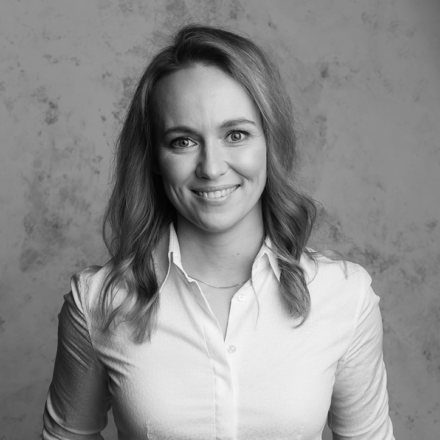
Depression in sports
Naomi Osaka withdrew from Roland Garros stating that she is having bouts of depression. Similarly to Andy Murray who went through such a tumultous period shortly after his injury. In the newest episode of Daria Abramowicz’s podcast you will be given the chance to experience their side of the story.
Sports psychologist and former competitive sailor will provide us with an insight into taking care of mental health and tackling psychological demands while being a full-time professional athlete.

- Podcasty
- Daria Abramowicz Podcast
- Depression in sports
Sports psychologist and former competitive sailor will provide us with an insight into taking care of mental health and tackling psychological demands while being a full-time professional athlete.
Transkrypcja
D. ABRAMOWICZ: Naomi Osaka's statement and the decision concerning this year's Roland Garros is a tip of an iceberg in terms of the discussion about mental health in sports. There is a lot to be said and that's why I would like to talk a little bit about the big picture.
Hey everyone, this isn’t a situation I ever imagined or intended when I posted a few days ago. I think now the best thing for the tournament, the other players and my well-being is that I withdraw so that everyone can get back to focusing on the tennis going on in Paris. I never wanted to be a distraction. I accept that my timing was not ideal and my message could have been clearer. More importantly, I would never trivialise mental health or use the term lightly. The truth is that I have suffered long bouts of depression since the US Open in 2018 and I have had a really hard time coping with that. Anyone that knows me knows I’m introverted and anyone that has seen me at the tournaments will notice that I’m often wearing headphones as that helps dull my social anxiety. Though the tennis press has always been kind to me and I want to apologize especially to all the cool journalists whom I may have hurt. I’m not a natural public speaker and get huge waves of anxiety before I speak to the world’s media. I get really nervous and find it stressful to always try to engage and give you the best answers I can. So here in Paris, I was already feeling vulnerable and anxious so I thought it was best to exercise self-care and skip the press conferences. I announced it preemptively because I do feel like the rules are quite outdated in Paris and I wanted to highlight that. I wrote privately to the tournaments apologising and saying that I would be more than happy to speak with them after the tournament as the Slams are intense. I’m gonna take some time away from the court now but when the time is right I really want to work with the tour to discuss ways we can make things better for the players, press and fans. Anyway, hope you’re all doing well and staying safe. Love you guys, I’ll see you when I see you.
I truly believe that this is the moment in which we could reach the turning point in the discussion about mental health in sports and as I mentioned before on many occasions not only in discussing mental training and sports psychology but mental health in sports. I think that Naomi Osaka’s statements and the whole situation and everything that’s going on Roland Garros this year 2021 is a chance to pursue the discussion, it’s a chance to open a new chapter into the discussion. So that’s why I’m trying to say these few words about it and to record this episode of my podcast in English. It’s actually the first episode in English, I don’t know if it’s going to be the last one or not. I just want to shed a little bit of light on what’s actually a key message that comes into the place in terms of – as I mentioned – Naomi Osaka’s statements, Grand Slam’s reaction and all the feedback that came into the place on media and social media regarding this matter. So, let’s just start from the beginning and from the first, I think, layer of the discussion which actually concerns press and media as kind of the source of external pressure that concerns athletes. Obviously, let’s just clarify: we will be talking about tennis players. So as far as you probably remember after Osaka’s statement and conclusion that the press is sometimes even hostile to the players and that the press conferences that players need to be doing after the matches whether it’s a win or loss are tough. I actually said on some occasion that probably the last thing that I would like to „have”, as a sports psychologist for my player after the match she’s lost, is to „have” to do the media. It’s kind of an obvious thing, let’s be honest. First thing is that while you’re performing your cognitive abilities, emotions, stress and tension levels are at their peak. Sometimes even the stress is skyrocketing and after the match, especially after a loss, there is this moment when everything just goes sometimes blank or when the turmoil is bigger and bigger and there’s a lot of thoughts, there’s a lot of emotions. Sometimes, obviously, there is a conclusion but for most cases, it’s not like it’s happening just right after the match. The press is sort of a mirror. There are some questions and sometimes these questions obviously are… Well, they might be different, let’s be honest. Obviously, I will talk about it later but we all need to be educating ourselves and for health professionals, mental health professionals would be great if they could be educating players, teams coaches, press, organisers, tennis and other sports stakeholders. But for most of the time, the questions concerning the performance are kind of urging players to confront with all the experiences that she or he had and it was just like a few minutes ago. Well, to be fair usually it’s like half an hour, one hour after the performance when the press is going on. And what’s the tough part here and sometimes the burden is that the player is in this very rough point with no filter and she or he feels sometimes that he is being judged because of the type of questions that are asked. But for most of the time, it’s just the thing that – as I know obviously that was the most common answer after Naomi’s statement – is that this nowadays is a part of the job and it’s hard to escape from that. Especially nowadays with top athletes, with high-performance sports and with the global sport – and tennis is one of the most global sports there are out there – is that building a relationship with the press, with media is the same part of the job as the business side of it is. So building relationships with partners, sponsors, tennis stakeholders. The first conclusion that’s coming into place after all of that is that that would be great if we would be focusing more on building healthy careers in terms of building healthy relationships, proper relationships with the press, athlete, coach, team and the media. There is obviously no golden rule here and there’s no simple solution to say: „We should be avoiding that” or „We should be going 100% into talking to media”. But nowadays… Let’s take a look at social media. It’s kind of a great platform for athletes to build their own perspective and to share their own narrative with the public, fans, to be able to present themselves and create and maintain their personal brand in terms of relationships – as I mentioned – with sponsors and partners. It’s also a good way to connect with people and a good way to promote the sport. So, these goals are very healthy and these goals are kind of… yes, part of the job. What we try to do is to educate. And for example, I had a situation a few days ago right after the – let’s say it in a quote – „Naomi’s case” when a player was asked a question and I felt that this question is sort of inappropriate in some ways. That was a question concerning mental health and I asked some other people to contact the media company and I tried to find the journalist and we tried to speak to the journalist very politely in a very assertive way and tried to educate and discuss why we think that the question might be a little bit different, why do we think that it might be inappropriate in terms of some boundaries. We got the feedback from the media that this is one of the very proper ways to build and maintain this healthy relationship between the player, team and the media and the press. And if someone’s asking me: „OK, so how can educate nowadays in terms of dealing with sort of external pressure that is coming from doing press or media?” I would say: „Let’s talk and let’s provide ourselves feedback and let’s discuss some ways of asking questions”. Obviously, one of the crucial things here would be being open for a discussion and not feel offended when, for example, a player or team would point out that the question might be a little bit inappropriate. So in terms of education and in terms of raising awareness on how could we change a little bit this narrative this relationship between players and media we obviously need all of the people involved on board. I mean here and I repeat that: players, teams, coaches, management, team’s sponsors sometimes partners, obviously tennis stakeholders as well. And obviously, it transfers to different sports as well. So I think in terms of this particular „Naomi Osaka’s case” that this is one of the crucial conclusions. But this whole situation and this whole experience, as I started this podcast, this episode brings a lot more discussion about mental health in sports. For me, this discussion starts with talking about the COVID effect – this one year or one year and a half. After tennis came back and other sports came back after lockdowns in this new COVID reality and this for me is the big picture here.
"It's been going on so long now and it's just frustrating" he said. "You can't get away from the tennis because you play your match, go back to the hotel and sit there and stare at the walls and think about the match because there's nothing else to do. You can't go for dinner with friends you can't fly home normally because it's just difficult to fly. It's not been that much fun recently but it's obviously harder if you lose and you're not winning which I haven't been doing. I think a lot of players are probably ready for a change of scenery. He's not alone among tennis players in believing the Olympics is more trouble than it is worth.
Let’s start with talking a little bit about the COVID reality in tennis. What you should know is that tennis players and teams and all organizers and all people involved in making tennis possible is that they – or we because I’m on tour as well – we have to live and we had to live in quarantines and we had to live in these tennis bubbles for now over a year. And it actually means, like, over one hundred tests because we, kind of, have to be tested every four days. For people that are vaccinated, for now, is, like, fourteen days after the second dose of the vaccine you’re kind of testing free but you know it’s a social responsibility to be obviously very cautious and be aware that the social responsibility is still the key here. But for now, it was like over one hundred tests and that means of course quarantines, that means living with the restrictions with all the measures, safety measures that need to be happening if we want to do sports. If we want to be in a sport in which the international competition is the key. Because it would be much easier to be in one place, to be kind of based in one place and compete over there but tennis needs travel and tennis needs to be in many parts of the world and sometimes these parts are fragile in terms of COVID. The tennis bubbles and all the restrictions that were and are still happening, they kind of take their toll on players and all other people involved mental health. For example – and I recorded this episode of the podcast in Polish – recently I’ve never seen this many withdrawals, I’ve never seen this many retirements from the tournaments, I’ve never seen this many injuries, even conflicts or tension in the teams and that’s all because of the COVID. That’s all because teams are all the time together, the travel is so tough, the reality of practising recovery – it’s really tough right now and it has been for over a year right now. The thing about it is that we, with this striving for perfection or, in a more healthy way, in pursuit of excellence, we kind of forget about the simple things that need to be done too. This is another key conclusion here in this episode: to have this healthy balance and healthy career. COVID took the toll on all of us, absolutely. And I’ve heard this opinion – I think it was around Australian Open, so January this year, that athletes hear all the time that their profession and what they’re doing is not the key thing, is not so important as for example other jobs like obviously doctors, nurses, frontline workers and a lot of other people. All of the athletes, they understand that. But if someone hears all the time that what he’s doing is irrelevant and it doesn’t have this meaning it might be a burden. I think the very important point here would be defining this balance again between feeling what’s the sport’s role nowadays, as, for example, bringing other people joy, but also for athletes what they are doing. For them, it’s the most important thing in the world because this is their life. Living in bottles and living in all these restrictions and living with all the stress that’s happening, feeling the social responsibility and, again, striving for this perfection – it brings a lot of emotional burden and it really is tough in terms of emotional well-being. So, as Jamie Murray said, this living in the bubble life and living all days in restrictions it’s just… You cannot go for dinner with friends, you can’t fly home between tournaments because you have to be quarantined. It’s sort of a shadow that covers all other areas of life, not just professional side of this life. So, what we are advising all sports people is – as I mentioned before – creating and maintaining the balance between work life and personal life, between work and recovery. First of all, it means to create and maintain this healthy and close social support network. Tennis is a solitary sport. It’s tough because at the end of the tournament there is just one person that doesn’t lose. Everyone else, at some stage of the tournament, loses. And this feeling, which is actually often combined with the feeling of loneliness and this burden with this pursuit of excellence or striving for perfection, it is tough. And this social security network – it practically means keep your close ones very close to you. It’s sort of a pillar and sort of solid ground in terms of creating a healthy career – especially nowadays, with all the factors that are very strongly related to external and internal pressure. So support, first of all. Then, we kind of forget about enjoying simple things and to be honest, every single time that I mention this I feel that: „OK, maybe I’m repeating this all the time and maybe people will think that this is too simple to be true, what advice is that?”. But trust me, really, trust me. In area of my experience, and from what I see every single day working with high-performance sports, business, education; enjoying simple things, putting more attention to these very, very simple and fundamental things in all areas of our lives, is a crucial thing. What I mean, for example, is sometimes enjoying a sunset. In tennis, you know, we’re able to finally go out for one hour every day out of the hotel, out of the bubble. Having this walk and being able to see, even right now in Paris, the Eiffel Tower, even every day, or just going and enjoying more spacious areas – this is sometimes everything. So, if you have a chance to enjoy a good coffee or enjoy very good food and you can actually eat this meal with real silverware, not the plastic ones – it’s a really important thing to have this. Balance means support, balance means simple things, balance means understanding that we are unable to live normally in these unusual times, its understanding and accepting – which is kind of a keyword here – that it’s OK that we feel more stressed, that we feel sometimes more anxious in some ways. This acceptance brings us closer to the solution. So, as I said, talking about the press and media being a source of external pressure and being this hard stuff, in terms of living in this career right now for high-performance athletes, this is sort of a tip of an iceberg. And this is this turning point that I’ve mentioned at the beginning of this episode that we could see the big picture.
I should have asked to go to my grandparents' funeral. I should have made those inquiries and seen if I could get out of the bubble and go home. I didn't. It's something that I'll probably regret for the rest of my life because I prioritised my tennis over things that were happening in my life. The only thing I can do now is move on and move forward. There is nothing wrong with having a therapist, or two, and a grief counsellor, and all of these things. I have to do what's best for me and work on myself. I think that definitely needs to be more open dialogue on what - not only her - but everyone on tour goes through. I think we don't talk about it enough. I support her and I appreciate her speaking out because maybe that will help other players, and other people, speak out on how they are feeling. Feelings are real and we're all human so I hope she takes the time she needs.
The other things I repeat since „Naomi’s statement” came out into the place, is that whenever we feel that we want to form an opinion about someone’s decision, someone’s choice, or even behaviour, it’s extremely important that we don’t form an opinion and we don’t comment on one’s mental health. Because we do not have all the information, we do not have data, we do not know the context of the situation. I do think that it should be loud and clear that we just respect the decision, for example, Naomi’s decision to share her experience and personally and professionally I really appreciate and respect the decision. But it’s extremely relevant at the same time, that we understand that there is a difference between discussing the whole context of what’s happening nowadays with high-performance sports or business or education in terms of all factors that are important in terms of external pressure, or internal, and we do not discuss that someone, for example, is privileged or is using mental health issues as a sort of an explanation of their impromptu decision to avoid the press. And to be honest, I’ve seen those tweets and comments and that’s why last, but not least, I would like to talk a little about these opinions that athletes are kind of privileged in terms of experiencing stuff, in terms of seeking treatments, in terms of living or not living with depression, anxiety, or other mental health struggles. Because I even have these tweets on my profile. For example, I tweeted the interview, Sloane Stephens’ interview for New York Times, and I got tweeted back that doing tennis nowadays is sort of an extremely traumatic experience. Well, in every single job there is a chance to get sick, or something, and it’s not just tennis and why she needed to stay in quarantine and couldn’t she really go back home. The thing is, that for athletes living this life since they were kids, since they were very little, and creating this environment where pursuing excellence and competing is sometimes everything – which is by the way unhealthy in terms of creating a healthy career but this is an idea for another episode – is that the choices that we all have to make – they are really tough. Especially right now with the COVID reality. Keeping in mind what I said at the beginning of this part of the episode, is that if we don’t want to speak, if we don’t want to comment on someone’s mental health, then we shouldn’t be commenting that someone is privileged or not. Because we don’t know that and to be honest it’s really not like that. For mental health, it’s kind of the same way as physical health, as dealing with injuries or diseases. There is no choice here, everyone, every single one of us could be suffering from depression, could be suffering from anxiety, eating disorders, sometimes addiction, or schizophrenia. It’s just sort of how do we approach this thing? How do we approach an injury, how do we approach a physical disease or how do we approach mental health issues? I understand that some people would comment that athletes are privileged because they do have the resources to seek treatment more effectively than other people. At some point that’s true because obviously they can approach it a little bit differently, seeking the treatment, seeking help of healthcare professionals. But on the other hand, this is very same with experiencing all the symptoms, the very same way with dealing with a sort of blame, of being weak. For athletes actually, with all the stereotypes concerning that they’re kind of gladiators, heroes that fight all the demons and all the weaknesses on these arenas. It’s sometimes even harder to seek help and this would be the last conclusion that I want to share with you: that athletes, high-performance athletes, and especially top athletes, being often public figures, are kind of seen as these strong, independent, powerful figures – with all this stereotype, whenever something’s going on which is not a physical injury and especially if this is something that concerns mental health, they sometimes feel that they have to deal with this through more practice, more physical work like training, and put it into dealing with this as they see this problem. With mental health, it sort of works that way that if we put more pressure, more work, especially physical work, in terms of dealing with mental health issues, is that it’s often getting worse. So, these paths of looking for support or treatment or solution for the problem they’re not proper ones. As for reality, as for now, especially with all the discussion that is brought into the place after Naomi Osaka’s statement, the other side of this big picture, other than COVID reality and that all the pressure that’s coming along with that in terms of high-performance sports, is that we really should be talking more about the social image of athletes that they’re kind of seen as these gladiators and not as human beings. First of all, an athlete always is and will be a human. And from that standpoint, everything might happen. That’s why an athlete, a high-performance or top coach, a businessman, a founder of a startup, influencer, celebrity is a human. As for that, we all have equal rights to seek treatment, to struggle sometimes, to deal with challenges. Because for us, it’s all the same.
Prowadzący

Ukończyła psychologię ze specjalnością psychologia kliniczna na SWPS Uniwersytecie Humanistycznospołecznym w Warszawie oraz szkolenie I stopnia w Centrum Terapii Skoncentrowanej na Rozwiązaniach CTSR, a także studia podyplomowe z psychologii sportu na SWPS Uniwersytecie Humanistycznospołecznym w Warszawie. Na co dzień współpracuje m.in. z Igą Świątek. Więcej na www.dariaabramowicz.com.

